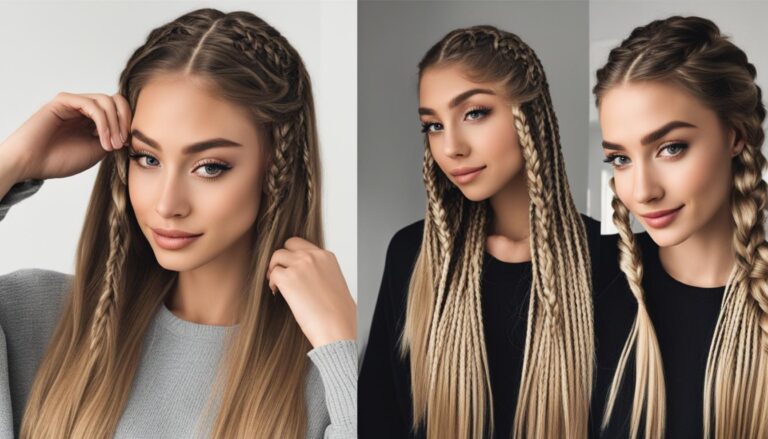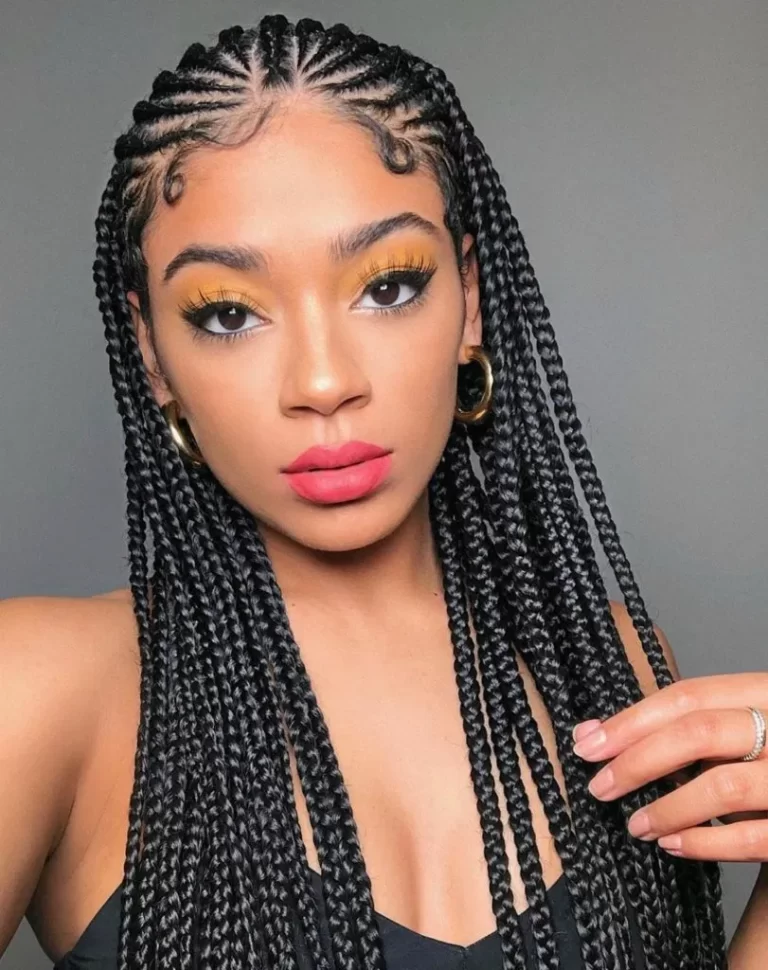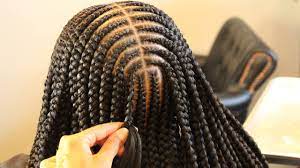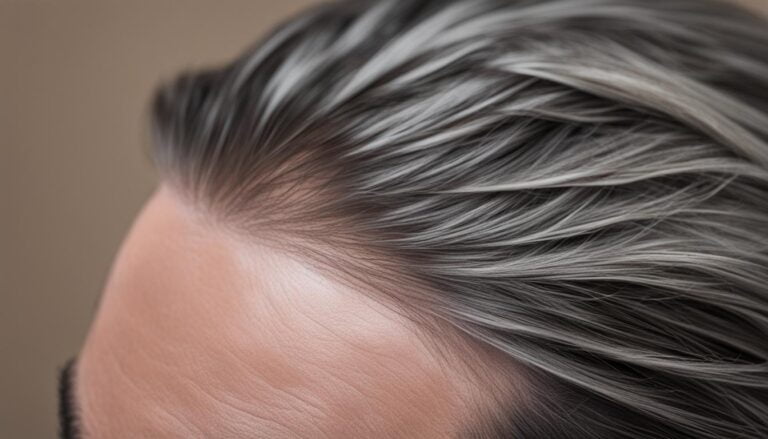Can low iron cause hair loss?
Iron deficiency is a condition that can have a significant impact on our overall health, including our hair. Iron plays a crucial role in the production of red blood cells and the transportation of oxygen to our tissues and organs, including our hair follicles. When there is a lack of iron in the body, a condition known as iron deficiency anaemia can occur, which has been linked to hair shedding and hair loss.
Iron deficiency anaemia can disrupt the hair growth cycle, leading to stalled hair growth and increased hair shedding. The body prioritizes the available oxygen supply to vital organs, neglecting the needs of the hair follicles. This lack of oxygen can cause the hair follicles to function improperly, resulting in hair loss and shedding.
Key Takeaways:
- Iron deficiency anaemia can contribute to hair loss and hair shedding.
- The lack of iron can disrupt the hair growth cycle and lead to stalled hair growth.
- The body prioritizes oxygen supply to vital organs over hair follicles when iron levels are low.
- Iron deficiency anaemia is reversible, and hair growth should resume once iron levels are restored.
- Consult with a healthcare professional for a proper diagnosis and tailored treatment plan.
How does low iron affect hair growth?
When the body lacks iron, it can have a significant impact on hair growth. Iron plays a crucial role in the production of red blood cells and the transportation of oxygen to our tissues and organs, including our hair follicles. If there is a deficiency in iron, the body will prioritize the available oxygen supply to vital organs rather than the hair follicles.
This lack of oxygen can cause the hair follicles to function improperly, leading to hair loss and shedding. When the hair follicles are deprived of oxygen, they may enter a dormant phase, resulting in stalled hair growth and increased hair shedding. This disruption of the hair growth cycle can lead to thinning hair and noticeable hair loss.
In order to maintain healthy hair growth, it is important to ensure adequate iron levels in the body. By addressing iron deficiency, individuals can help support proper hair follicle function and promote optimal hair growth.
Symptoms of Iron Deficiency Anaemia
We have established that iron deficiency anaemia can contribute to hair loss, particularly in women. In this section, I will discuss the common symptoms associated with iron deficiency anaemia. It is important to recognize these symptoms and consult with a healthcare professional for a proper diagnosis.
One of the key symptoms of iron deficiency anaemia is extreme tiredness. This fatigue can be debilitating and can affect your daily life and overall well-being. Other symptoms include a lack of energy, pale skin, and breathlessness. You may also experience heart palpitations, which can be alarming. And of course, one notable symptom is hair loss, specifically diffuse hair loss from the scalp.
Women, in particular, are more susceptible to iron deficiency anaemia due to factors such as menstrual blood loss. Additionally, certain lifestyle choices, like a vegetarian or vegan diet, heavy exercise, and pregnancy, can increase the risk of iron deficiency and consequently, hair loss. If you are experiencing these symptoms or suspect iron deficiency anaemia, it is crucial to seek medical advice for proper diagnosis and treatment.
Key Symptoms of Iron Deficiency Anaemia:
- Extreme tiredness
- Lack of energy
- Pale skin
- Breathlessness
- Heart palpitations
- Diffuse hair loss from the scalp
Recognizing these symptoms is the first step in addressing iron deficiency anaemia and its associated hair loss. In the next section, we will delve into the diagnosis and treatment options available to help restore iron levels and promote hair growth.
Diagnosis and Treatment of Iron Deficiency Anaemia
If you suspect that iron deficiency anaemia is the cause of your hair loss, it is important to undergo a blood test to determine your iron levels. The blood test may include analysis of serum iron, TIBC, transferrin saturation, ferritin, and a full blood count. These tests will help your healthcare provider diagnose iron deficiency anaemia and determine the appropriate treatment plan.

Once diagnosed, your doctor may recommend iron supplements to replenish your iron stores and improve hair loss. The dosage of iron supplements will depend on various factors like sex, menstruation, pregnancy, and breastfeeding, so it is crucial to consult with a healthcare professional before starting any supplementation. Regular blood tests will help monitor your iron levels and adjust the dosage as needed.
In addition to iron supplements, dietary changes may be suggested to help increase your iron intake. Incorporating iron-rich foods into your diet, such as seafood, lean red meat, dark leafy green vegetables, lentils, beans, nuts, and fortified grains and cereals, can help maintain healthy iron levels. Consuming foods high in vitamin C alongside iron-rich foods can enhance iron absorption. Good sources of vitamin C include guava, papaya, kiwi, strawberries, oranges, sweet peppers, and broccoli.
Summary:
- Diagnosis of iron deficiency anaemia involves blood tests to determine iron levels.
- Treatment may include iron supplements and dietary changes.
- Consult with a healthcare professional for proper diagnosis and customized treatment plan.
- Regular blood tests will monitor iron levels and adjust the dosage of supplements if necessary.
- Incorporate iron-rich foods and foods high in vitamin C into your diet to maintain healthy iron levels.
Reversibility and Timeframe of Hair Loss from Low Iron
Iron deficiency is a common cause of hair loss, but the good news is that it is usually reversible. Once iron levels return to normal, the hair follicles will transition back into the active growth phase, and hair growth should resume. However, it’s important to note that the timeframe for hair regrowth can vary for each individual. It may take several months for the body to rebuild its iron stores and for noticeable hair growth to occur.
To ensure the best outcomes, it’s crucial to be patient and continue with the recommended treatment plan. Consistently following the prescribed dosage of iron supplements and making dietary changes can effectively replenish iron stores and promote hair growth.
Remember, everyone’s hair growth journey is unique, and individual results may vary. It’s essential to consult with a healthcare professional who can provide personalized guidance and monitor your progress. By staying committed to your treatment and maintaining a healthy lifestyle, you can optimize the chances of regaining your hair’s fullness and thickness.
Key Takeaways:
- Low iron levels can contribute to hair loss, but it is usually reversible.
- Hair growth can resume once iron levels return to normal, but it may take several months.
- Be patient and continue with the recommended treatment plan for the best results.
- Consult with a healthcare professional for personalized guidance and support.
Iron Supplements for Hair Loss Treatment
Iron supplements can be a helpful solution for treating hair loss caused by iron deficiency. By replenishing iron stores in the body, these supplements can support the proper functioning of hair follicles and stimulate hair growth. However, it is important to consult with a healthcare provider before starting any supplementation to ensure the correct dosage and avoid any potential side effects.
The appropriate dosage of iron supplements for hair loss can vary depending on factors such as sex, menstruation, pregnancy, and breastfeeding. Your healthcare provider will be able to recommend the most suitable dosage for your specific circumstances. Common types of iron supplements include ferrous sulfate, ferrous gluconate, ferric citrate, and ferric sulfate.
It is crucial to monitor your iron levels regularly through blood tests to ensure they return to normal and to adjust the supplement dosage if needed. Some individuals may experience side effects such as constipation when taking iron supplements. To alleviate this, consider taking slow-release supplements or supplements paired with vitamin C, which can aid in iron absorption.
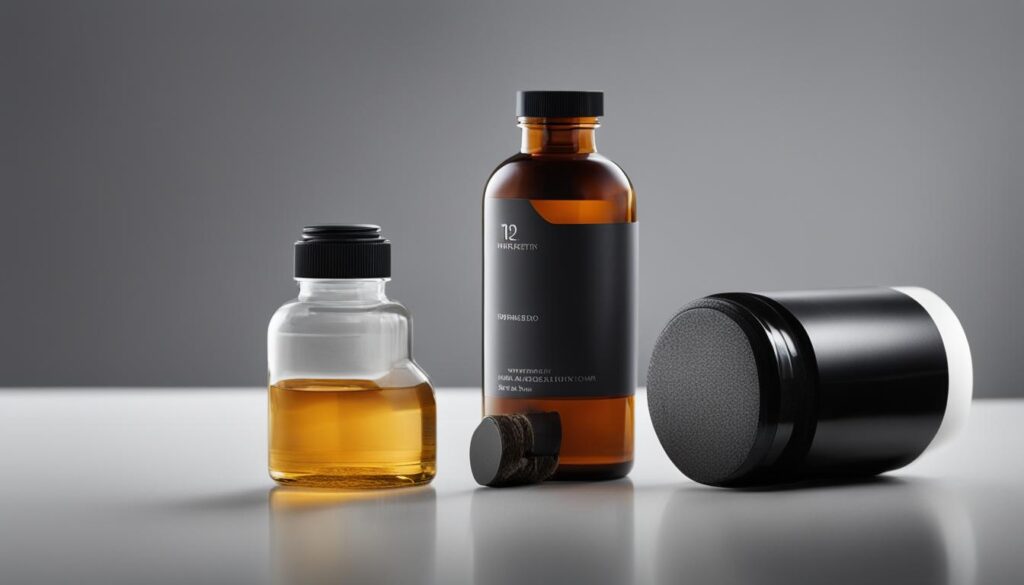
Adding iron supplements to your treatment plan can be an effective way to address hair loss caused by iron deficiency. However, always consult with a healthcare professional before making any changes to your medication or supplementation routine. They can provide personalized guidance and monitor your progress to ensure optimal results.
Maintaining Healthy Iron Levels
Ensuring that you maintain healthy iron levels is essential for promoting overall hair health. By incorporating iron-rich foods into your diet, you can provide your body with the necessary nutrients to support optimal hair growth and prevent hair loss. Some of the best sources of iron include lean red meat, seafood, dark leafy green vegetables, lentils, beans, nuts, and fortified grains and cereals.
Additionally, consuming foods rich in vitamin C alongside iron-rich foods can enhance iron absorption, further maximizing the benefits for your hair. Vitamin C-rich foods such as guava, papaya, kiwi, strawberries, oranges, sweet peppers, and broccoli can help ensure that your body efficiently absorbs and utilizes the iron it receives from your diet. Incorporating these foods into your meals and snacks can be a simple and effective way to support your iron levels and promote optimal hair health.
Remember that maintaining healthy iron levels is not just about the foods you eat but also about avoiding factors that can decrease iron absorption. For example, black tea has been found to inhibit the absorption of iron. Therefore, it is important to limit your consumption of black tea, especially when consuming iron-rich foods, to ensure that your body can absorb and utilize the iron properly.
In addition to a balanced diet, it is important to consult with a healthcare professional for personalized advice on maintaining healthy iron levels. They can provide guidance on appropriate iron supplementation if necessary and monitor your iron levels through regular blood tests to ensure optimal hair health and overall well-being.
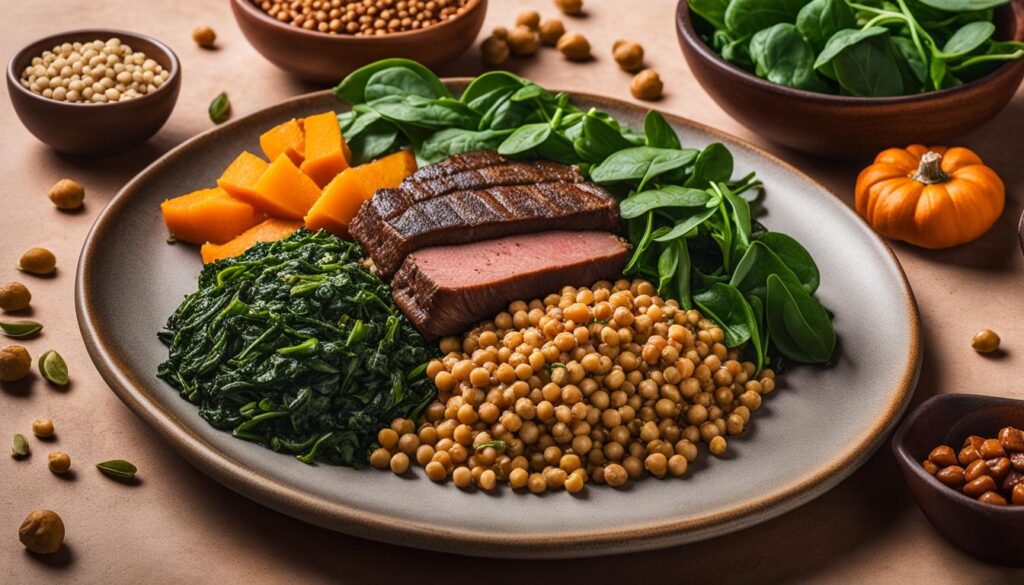
Conclusion
In conclusion, the connection between iron deficiency and hair loss is significant. Low iron levels can disrupt the hair growth cycle and lead to hair thinning and shedding. Iron deficiency anaemia occurs when there is a lack of iron in the body, and it can cause hair loss as well as other symptoms such as extreme tiredness and pale skin.
If you suspect iron deficiency anaemia as the cause of your hair loss, it is important to consult with a healthcare professional for a proper diagnosis and tailored treatment plan. A blood test can determine your iron levels, and if diagnosed with iron deficiency anaemia, your doctor may recommend iron supplements and dietary changes.
It is important to be patient during the treatment process, as it may take time for noticeable hair growth to occur once iron levels are restored. Maintaining a balanced diet and incorporating iron-rich foods into your meals can help prevent iron deficiency and promote overall hair health. Remember to monitor your iron levels through regular blood tests and adjust the dose of iron supplements accordingly.
FAQ
Can low iron cause hair loss?
Yes, low iron levels can contribute to hair loss and hair shedding.
How does low iron affect hair growth?
When the body lacks iron, it prioritizes the available oxygen supply to vital organs rather than hair follicles. This lack of oxygen can cause the hair follicles to function improperly and may lead to hair loss and shedding.
What are the symptoms of iron deficiency anaemia?
Common symptoms of iron deficiency anaemia include extreme tiredness, lack of energy, pale skin, breathlessness, heart palpitations, and diffuse hair loss from the scalp.
How is iron deficiency anaemia diagnosed and treated?
Diagnosis involves blood tests to determine iron levels, such as serum iron, TIBC, transferrin saturation, ferritin, and a full blood count. Treatment may include iron supplements and dietary changes. It is important to consult with a healthcare professional for a proper diagnosis and tailored treatment plan.
Is hair loss from low iron reversible?
Yes, hair loss caused by iron deficiency is usually reversible. Once iron levels return to normal, hair follicles will transition back into the active growth phase, and hair growth should resume. However, it may take several months for noticeable hair growth to occur.
Can iron supplements help with hair loss treatment?
Yes, taking iron supplements can help replenish iron stores and improve hair loss due to iron deficiency. It is important to consult with a healthcare provider before starting any supplementation and to monitor iron levels through regular blood tests.
How can I maintain healthy iron levels?
To maintain healthy iron levels, it is important to incorporate iron-rich foods into your diet, such as seafood, lean red meat, dark leafy green vegetables, lentils, beans, nuts, and fortified grains and cereals. Consuming foods high in vitamin C alongside iron-rich foods can enhance iron absorption.
What is the conclusion about iron and hair loss?
Iron deficiency anaemia can disrupt the hair growth cycle and lead to hair thinning. However, hair loss from iron deficiency is typically reversible with the restoration of normal iron levels. Maintaining a balanced diet and incorporating iron-rich foods can help prevent iron deficiency and promote overall hair health.



